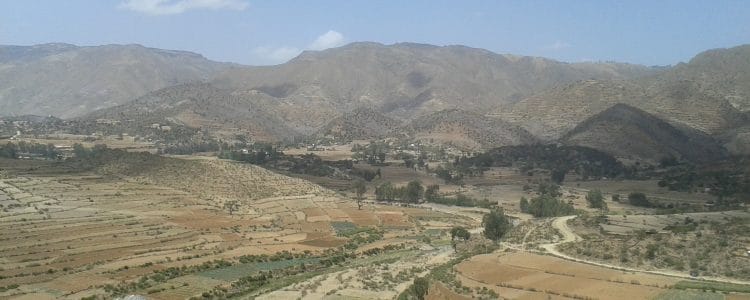
Roads can result in new job opportunities because of new transportation possibilities, improved market access and the possibility of labour migration. Unfortunately, in Adiksandid, Ethiopia, not all these new opportunities seem to be entirely positive and not all citizens profit from the new opportunities.
February 18, 2015 marked the 40th anniversary of the Tigray People’s Liberation Front (TPLF). On this day, Ethiopians organized a parade of decorated trucks to show the achievements of the country since liberation. One of them was full of road contractors and constructors who were proud of the construction of a road network of more than 50,000 km. These new roads have contributed to several developments, including improved access to education and healthcare. They have also impacted on employment opportunities and market access. The question is: do the people of Adiksandid, a rural village in the Tigray region of Ethiopia, enjoy these benefits? As part of the research project ‘Feeder road development for inclusive productive employment’, this study looked at the impact of roads on employment and market access in Adiksandid.1
NEW EMPLOYMENT OPPORTUNITIES
During our visit to Adiksandid on the 40th anniversary of the TPLF we took a ‘bajaj’ (local transport) from Wukro Town. After 15 minutes of driving on asphalt, the road became bumpy and sandy. According to our driver, this way of transportation to the village was not possible a few years ago: ‘Before the road construction people and products were transported by donkeys because it was impossible for vehicles to come to the village. Nowadays people can use other transportation like cars, mini-buses, etc.’
This is an example of a new employment opportunity created by the construction of the road, as jobs such as drivers did not exist before. Besides these new transportation possibilities, other opportunities have emerged. First, small shops and cafes were established along the road, of which most are located at the beginning near the asphalt road. Then jobs became available in other areas and the possibility to migrate for daily, temporary or permanent labour opened up. The stone grinding industry has expanded because of the availability of transport and increased demand for stone for road construction. Finally, wholesalers, retailers and middlemen have also profited, as their services have become more accessible.
According to a local day labourer, ‘there are more job opportunities now because of the road’. However, not all of these new opportunities seem to be entirely positive and not all citizens profit from these new job opportunities, as there are great geographical differences between villages resulting in remote households still living far from the road and not being able to use these new transportation possibilities.
IMPROVED MARKET ACCESS
Roads have an even greater impact on employment if we take into account their impact on access to markets. By providing market access, road development can lead to an increase in the quantity, quality and diversity of goods. The citizens of Adiksandid are enjoying a wider variety and improved quality of (fresh) products. A housewife shared that, ‘it is because of the road that we can now buy more and different products of better quality’.
However, improved market access also leads to increased market competition, resulting in different prices for consumers and lower incomes for farmers. These lower incomes seem to be caused by the increased role of traders. A local farmer shared that, ‘when a trader comes to the village to buy our product, the price we receive is much lower than the price we would get if we would sell our product at the market in town’. Furthermore, according to other local farmers, traders ‘do not care about us’ and often ‘give too little money’.
Despite these negative associations with traders, some farmers are quite happy with the road constructed, as they save time, energy and transportation costs. The same is true when farmers go to the market themselves, but sell their whole product to a wholesaler. Again, the farmer receives a low price, but some farmers were quite happy with these wholesalers, explaining that ‘yes, he will earn some more money, but for me it would be tiresome to sit at the market all day and sell my products, instead of saving time and selling my products all at once in the morning to a wholesaler’.
CONCLUSION
So can we conclude that roads result in new job opportunities? Yes, as the results have shown, new job opportunities came into existence after the construction of the road. However, citizens do not benefit equally and, furthermore, for some people these new opportunities do not seem to be entirely positive. Some important strategies are still missing in the current policies and to maximise the potential of feeder road development and employment, strategies for transportation and training about market intelligence are needed. Furthermore, it is important that the government facilitates agreements between farmers and traders to level the playing field and protect farmers from low prices. These policies can increase the benefits in an equitable manner and ensure that traders do not exploit farmers.











